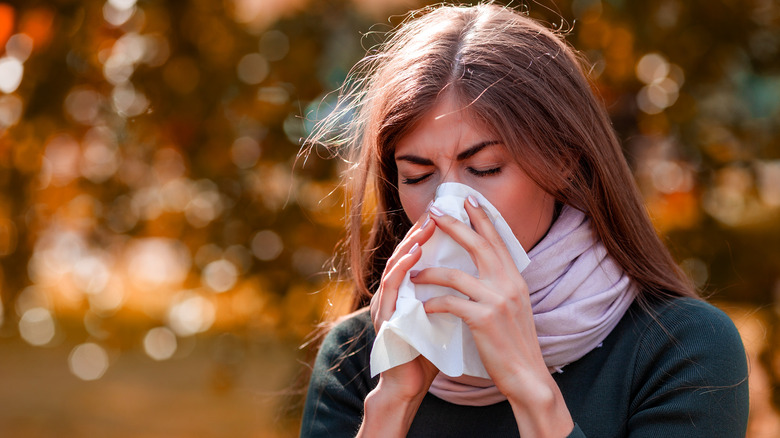How To Better Manage Those Pesky Fall Allergies
Believe it or not, people who suffer from seasonal allergies don't just experience symptoms in the spring and summertime. According to experts at HealthDay News, they can also experience them in the fall. That's because volatile weather patterns in the fall can bring about sneezing, difficulty breathing, and other common symptoms of seasonal allergies. As a matter of fact, extreme weather and natural disasters can increase the amount of allergens in the air.
Since the U.S. is currently in peak ragweed season, there is quite a bit of pollen in the air, in addition to the typical mold spores. And with hurricane season and other tropical storms underway, this may accelerate fungal growth and increase the amount of fungal spores in the air, which can worsen allergy symptoms. "If you are mold-allergic or you have mold-related asthma, those can get dramatically worse very quickly and that is a real threat to health," Dr. David Corry, a professor of medicine in the section of immunology, allergy, and rheumatology at Baylor College of Medicine, said in a news release.
Here's what you can do to prevent and reduce allergy symptoms
Fortunately, there are a number of things you can do to help manage your fall allergies. For instance, one of the best ways to lessen your allergy symptoms is to completely avoid or reduce your exposure to common allergens, like pollen and mold. According to PopSugar, you can do this by covering your nose and mouth with a face mask, keeping all of your windows closed when pollen counts are particularly high, washing your bedding on a regular basis, and using an air purifier.
"We also recommend avoiding going outside on windy days and delegating tasks such as lawn-mowing and other yard work to someone who does not have allergy symptoms," Dr. Sanjeev Jain, a board-certified allergist, and immunologist at Columbia Asthma and Allergy Clinic, told PopSugar. In addition, it may be helpful to go visit an allergy specialist. This can help you identify exactly what you're allergic to so you can find the right treatment. If you have seasonal allergies, your doctor will likely recommend taking over-the-counter antihistamines and steroid nasal sprays. If these medications don't help your symptoms improve, however, they might suggest allergy shots or immunotherapy.


